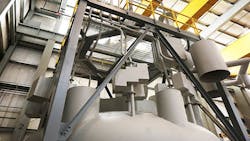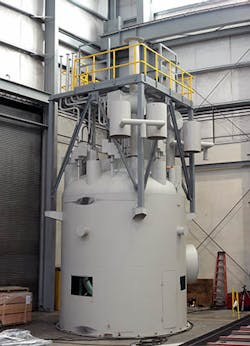Nuclear power is a paradox. It is “clean” energy because it results in no carbon dioxide emissions, and yet it presents a different environmental concern, involving disposal of spent fuel. That’s a decades-old problem that’s considered less concerning, in view of the world’s expanding need for light, heat, and power.
Then there is the paradox of cost: nuclear energy is generally considered affordable, because it’s not susceptible shortages as oil and gas may be, though the development time and cost of nuclear projects can be prolonged for decades thanks to regulatory issues, as well as reactor design and construction.
There is a paradox in the opportunity that nuclear power presents to system designers and suppliers too, like the forgers need to supply the highly engineered structural units that form reactor vessels. Forging is the manufacturing method of choice for these steel parts, which must be large and dense, with the proper shape to contain the reactor and materials used in the energy-generating process.
The paradox is that only a handful of forgers are able and certified to produce such vessels; the factors that slow development of nuclear power projects also discourage more forgers from entering the game. And, without a steady flow of new projects, more competitors are reluctant to take the risk of investing in that capability.
In the past year a U.S. developer has cut through many of the limitations with a new, small modular reactor design — and that design is providing a new line of activity for a noteworthy forging operation.
Portland, OR-based NuScale Power LLC calls itself the only U.S. company established to commercialize small modular reactor (SMR) technology, which it developed. It calls the NuScale plant design “simple, safe, economic and scalable.” NuScale has designed an Integral Pressurized Water Reactor (IPWR) based on light water reactor technology, a technology used to generate power several decades. It claims its “simplified, passive technology” is suitable to a design that reduces complexity and safety risks and enhances operability. It plans to develop new, modular power plants - scalable in 50 MWe (gross) increments.
The system is less complex because it relies only on gravity, convection, and conduction (“natural forces of physics,” according to NuScale) for normal operations and shutdown. Many large and complex systems that are common to larger reactor design (e.g., reactor coolant pumps, motors, valves, large-diameter reactor coolant system piping) are not involved in the NuScale design.
In the spring of 2015, NuScale Power completed fabrication and assembly of a full-scale, upper module mockup of its NuScale Power Module™, consisting of the top assembly of the NPM from the module access platform down to the elevation of the reactor vessel head. With accurately sized and located components, the mockup is used to test inspection and maintenance activities that are essential to plant operation. Included in the assembled mockup are the upper portion of the containment vessel; a reactor vessel head; major piping (steam, feed water, and CVC); control rod drive mechanisms; major valves, e.g., isolation valves and ECC valves; and the module access platform.
“The fabrication of this full-scale, upper module mockup is an important step in the continued support of our reactor design,” Dale Atkinson, NuScale’s COO and chief nuclear officer, stated at that time.
Fast-forward to Spring 2016, and NuScale is at work with several developers to build its first commercial-scale reactor near the Idaho National Laboratory, Idaho Falls, ID. NuScale is the only SMR developer currently receiving U.S. Department of Energy matching funds ($217 million over five years), and is on track to submit a Design Certification Application to the U.S. Nuclear Regulatory Commission later this year.
On the current development schedule, the Idaho plant would be operational in 2024. “I know that is eight years from now,” according to NuScale’s chief commercial officer, Mike McGough. “That seems like a long time, but in the space of what we're doing in the technology development and deployment, it's actually quite short.”
A wholesale electricity supplier would own the Idaho plant and discussions are underway with a nearby utility company to operate the plant. That utility is separately interested in investing in more NPM capacity at its current generating plant locations, according to McGough.
For forgers, the timing is more immediate. British engineering firm and open-die forger Sheffield Forgemasters International Ltd. and NuScale have agreed to work together to develop the manufacturing techniques that will be required for installing small modular reactors in the U.K. SFIL will forge a large, civil nuclear reactor vessel head by the end of 2017, as part of a program supported by Innovate UK, a governmental arm that promotes technical research efforts for commercial interests. The project aims to develop and validate forging and fabrication processes for the nuclear industry. NuScale is providing funding in order to support the use of the geometries required by its SMR design.
Sheffield Forgemasters has extensive experience in forging reactor vessel components, and developing the manufacturing methods for comparable parts is critical to establishing the viability of SMR technology.
“Small Modular Reactors could revolutionize the civil nuclear power industry, by creating more flexible power generation solutions,” commented SFIL CEO Graham Honeyman. “The efficient factory manufacture of major components will be crucial to seeing them deployed cost effectively, and Sheffield Forgemasters has an unparalleled track record in the production of civil nuclear forgings of this size.
“NuScale’s design is one of the most advanced in the world,” he concluded, “and this forging project will allow us to prove yet again that U.K. manufacturing is at the leading edge of global technological advancement.”
About the Author
Robert Brooks
Editor/Content Director - Endeavor Business Media
Robert Brooks has been a business-to-business reporter, writer, editor, and columnist for more than 20 years, specializing in the primary metal and basic manufacturing industries. His work has covered a wide range of topics including process technology, resource development, material selection, product design, workforce development, and industrial market strategies, among others.
Currently, he specializes in subjects related to metal component and product design, development, and manufacturing—including castings, forgings, machined parts, and fabrications.
Brooks is a graduate of Kenyon College (B.A. English, Political Science) and Emory University (M.A. English.)


